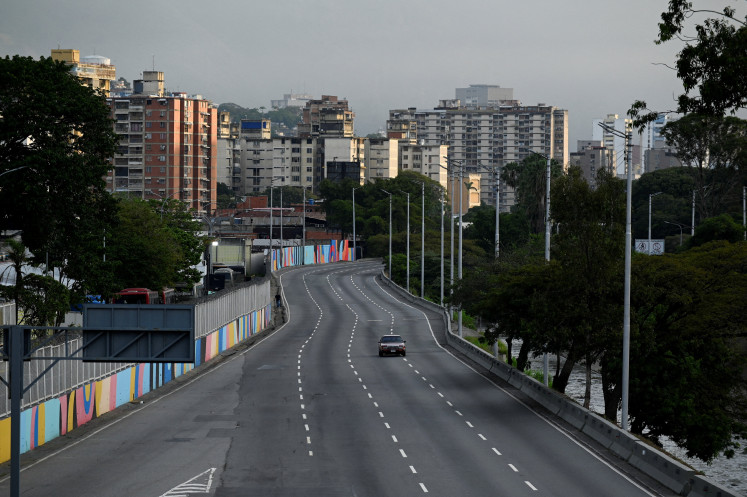Popular Reads
Top Results
Can't find what you're looking for?
View all search resultsPopular Reads
Top Results
Can't find what you're looking for?
View all search resultsCritical thinking at this critical time
The moment of truth in the political arena is right before our very eyes
Change text size
Gift Premium Articles
to Anyone
T
he moment of truth in the political arena is right before our very eyes. The future of this country is in our hands, and what will become of it will depend on what we do or don't do today.
The mass media and cyberspace are bombarding us with opinions, from anyone who wants to share his/her views for anyone who cares to listen, and touting this or that presidential candidate to vote for.
It is difficult for ordinary people like us to judge an issue or to pinpoint who is telling the truth because there are many sides to an issue and anyone can present the truth depending on what the speakers want the public to believe. This is the reason why we need to develop critical thinking so that we can make the right decision.
Based on a definition put forward by Moore and Parker (2001), we exercise critical thinking when we carefully examine what is stated to be true and decide whether or not we should accept it, and how confident we are in our acceptance or rejection.
How many of us spend time thinking about the statements uttered by our politicians? We tend to immediately form opinions without much thinking, and this prevents us from uncovering the truth. The decision that we make, not only in choosing our country's leaders but in work and in our personal lives as well, should be backed up by evidence, otherwise it can lead to a wrong decision that may have a disastrous effect on our life.
According to Martin Luther King, Jr., the American civil rights leader, it is in school that the skill of critical thinking is developed, alongside the development of skills in reading and writing. It is important, then, for schools to instill in their students the desire to seek out the facts to support one's opinion and to make good decisions.
In school, there should be balance between the teaching of facts and stimulating students to think. One can't argue without facts, and facts are useless if not used in decision-making. Some of us just come out with our opinions without any basis.
We think that if we are good at getting our argument across, without supporting it with facts, that is enough.
So in school, having to go through theories and find out and test their applicability would be important to encourage students to develop their skills in critical thinking.
Aside from lecturers encouraging their students to openly air their opinions in class, debates should also be held.
This way, students would be trained to conduct research on a particular issue, present their side of the issue and participate in a healthy exchange of ideas.
If we exercise critical thinking in choosing our president, what qualities do we need to look for?
Chris Lowney writes that the leadership principles that have guided the Jesuits (male religious congregation of the Catholic Church) for more than 450 years include four core pillars: self-awareness, ingenuity, love and heroism.
Only leaders who possess both intelligence and character can adopt these four core leadership pillars. Without intelligence, self awareness and ingenuity, they would be difficult to achieve, and without character one would have difficulty in being concerned about others and being passionate.
If we exercise critical thinking in choosing our president, what would this leader look like?
In Lowney's latest book on Pope Francis, the first Jesuit priest to become Pope, he wrote that one of Francis' many admirable qualities was remaining true to who he really is. It takes courage to be who we really are, especially in business and politics where appearance and worldly possessions are considered more important than a person's character.
Lowney quoted the first black president of South Africa, Nelson Mandela: 'My greatest enemy was not those who put me in prison. It was myself. I was afraid to be who I am.' I should confess that is my greatest fear, too.
I now realize the heavy burden that we leaders have in remaining true to what we are committed to doing for the good of our organizations ' or for the presidential candidates for the good of our country ' because many people tell us what kind of person we should be to be a good leader. When we become what others want us to be, we have ceased to be a leader.
To remain true to theselves, according to Lowney, the Jesuits have been trained to make a habit of self-examination, which should also be applied to other leaders so as to be able to lead with integrity and character.
As leaders, we need to accept that we have weaknesses; and to function effectively, we need to struggle every day to fight ourselves not to give in to our impulses.
Being a leader is a calling, like being called for the priesthood in the Catholic religion. A leadership position is not to be sought; it will be bestowed upon the right person at the right time.
When we choose our leaders, we should choose one who knows that being a leader is to serve. We have been shown by the examples of Mandela and Francis that being true to oneself is the key, and that true leaders possess power, which in the words of Pope Francis and as shown by his actions, 'authentic power is service'.
Let's stick to the facts when judging and scrutinizing our candidates' platforms.
The real winner in this upcoming presidential election will be the Indonesian people, if and only if we exercise critical thinking.
_________________
The writer is director for operations and programs at the GS FAME, Institute of Business in East Jakarta. The opinions expressed in this article are solely her own and do not necessarily reflect those of her institution.










